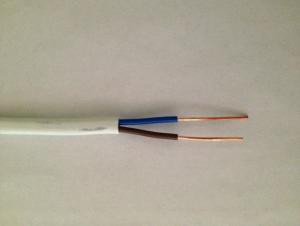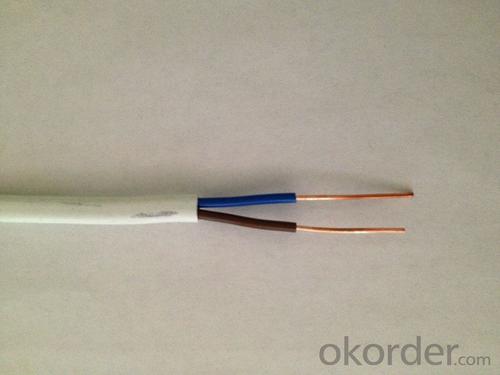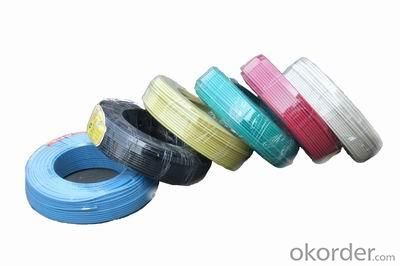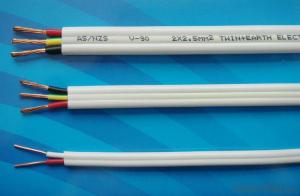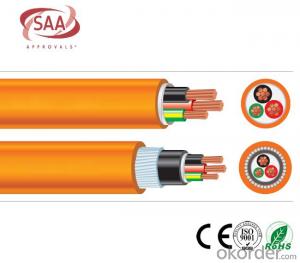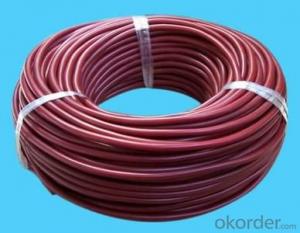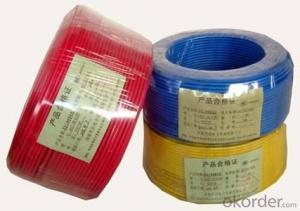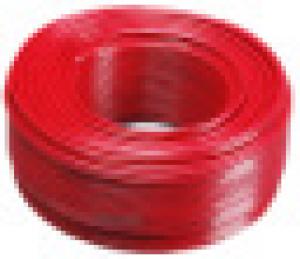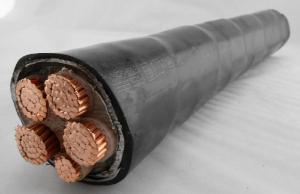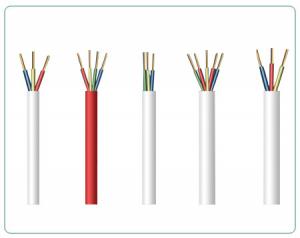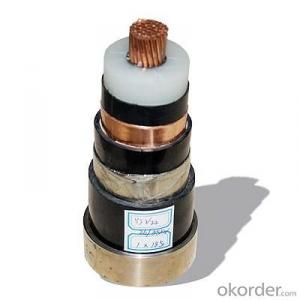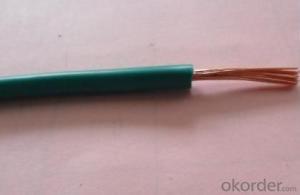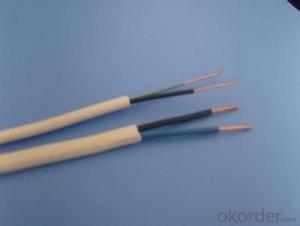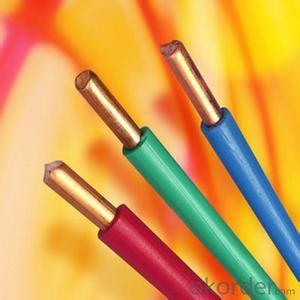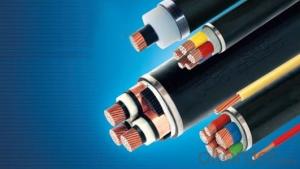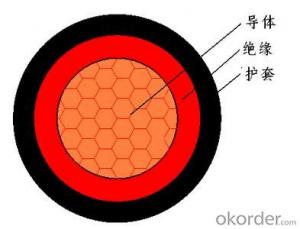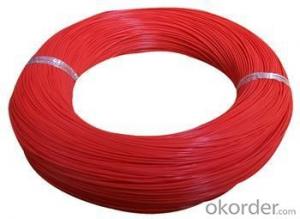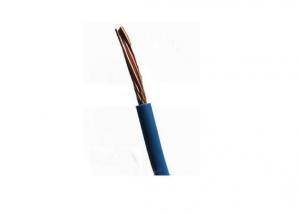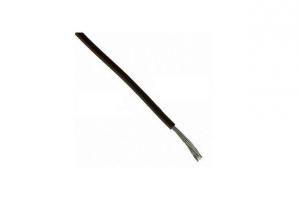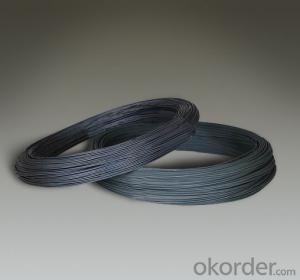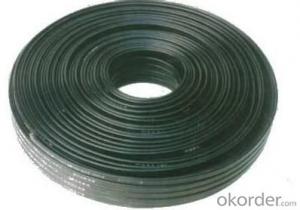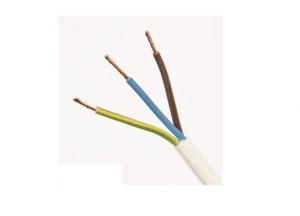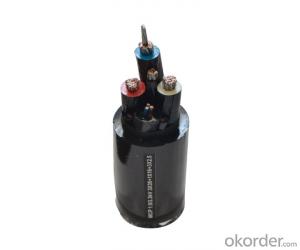PVC Insulated Copper Wire Building Wire
- Loading Port:
- China Main Port
- Payment Terms:
- TT or LC
- Min Order Qty:
- -
- Supply Capability:
- -
OKorder Service Pledge
OKorder Financial Service
You Might Also Like
1. Product Description:
1. building electric cables wire Appliation
Cables used for communication system, its rated voltage should be at least equal to the system of nominal voltage, In dc system, nominal voltage should not greater than 1.5 times of rated voltage, System allows more than nominal voltage working voltage by 10%.
2. Product Characteristic:
(1)cables long-term allowed no more than 70°c, BV - 90 shall not exceed 90 Celsius temperature , the installation should not below 0°c Celsius temperature .
(2) cable permissible min. bending radius: less than 25 mm of exterior cable should be no less than 4 times of cable diameter, if for 25 millimeters, wire bending radius should not less than 6 times of cable diameter.
(3) wire and cable length of knitting or into the dish for 100 meters, length error of 0.5 meters
(4) RV - 90 long-term allowed no more than 90 °c
3.Specification:
Type | Name | Laying place and requirement | Crated voltage | Nominal Section (mm2 |
227IEC01(BV) | Copper conductor PVC insulated wires Aluminum conductor PVC insulated wires | Fixed laid indoors Conduit etc. | 450/750 300/500 450/750 | 1.5...185 |
227IEC05 (BV) | 0.5...1 | |||
BLV | 2.5...185 | |||
227IEC07(BV-90) | Heat resistant copper conductor PVC insulated wire at 900C | Mainly be laid at the places of high temperature environment and can be laid indoors ,conduits. | 300/500 | 0.5...2.5 |
BVR | Copper conductor PVC insulated flexible cable | Be for laying permanent place where flexible required. | 450/750 | 2.5...150 |
BLVV | Aluminum conductor PVC insulated PVC sheathed round wires |
Fixed laid, fit for the places with high mechanical protection and moisture place, can be laid in the air or underground. | ||
BVVB | Copper conductor PVC insulated PVC sheathed flat wires | 300/500 | 1...10 | |
BLVVB | Aluminum conductor PVC insulated PVC sheathed flat wires | 300/500 | 2.5...10 | |
227IEC02(RV) 227IEC06(RV) | Copper conductor PVC insulated flexible connector wire | Mainly used at middle and light style moving electronics, home appliances, power and lighting and the places where flexible required | 450/750 300/500 | 1.5...240 0.3...1 |
227IEC42(RVB) | Copper conductor PVC insulated flat flexible connector wire | 300/300 | 0.3...1.5 |
4. Reference Picture:
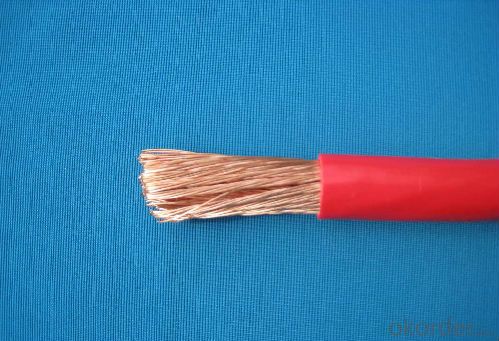
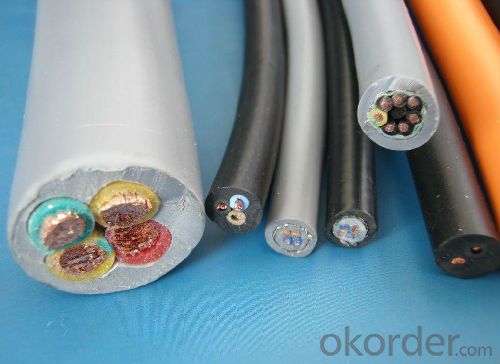
- Q: 16 square millimeters of wire how rough how to calculate
- According to the norms of the words can not. A line of a tube, unless the control line and then wear a tube no problem. Air conditioning line is not very standardized, according to the provisions should be 16 square below, are the same diameter. But the words of their own home can be used. Specifically to see how you set the.
- Q: I'm doing some wiring in my house (lights, outlets) for a add on room in the basement. I plan on having the computer on one side of the room and the HDTV on the other side. In theory the Internet will be with the computer, and I run Network wire over to the TV and xbox 360 (about 35 ft away). (Yes I know some of these I could do wireless, but I can't do all of it that way)I was going to run some network wire through the walls while everything is being built. I also am running some Cable wire (For cable Internet and for an Antenna). My fear is, I'm going to have to cross over (next to) the electrical Wire that is in the wall and ceilings. I fear this could cause some interference on the line (TV, or Network). Is there anything I do to stop this? Actually my thought was to wrap the electrical wire in some Tin Foil, but I'm not sure if thats the best idea? I'm really just wanting to add another layer to block any interference? Thanks
- Tin foil won't do anything, especially if it's not grounded anywhere. If anything, the foil is it starts to corrode and rub against itself, may cause more RF static if it has any induced currents in it already. That may interfere with the TV even more The ethernet cable is not sensitive to the electrical cable, it should not cause any issues for that distance. Your cable TV cable, though, may get some induced 60hz hum, albeit very little over 35 feet. If using good quality CATV cable, like proper RG6, you should be ok.
- Q: When the high-voltage wire landing, the ground surface with a large current through, if people close to the ground, the feet also have a large voltage, Which will not form an electric shock?
- This is the power of HuntKey, this figure is the Lenovo computer chassis lights on the power cord, more special, not connected, then the impact is not, but the indicator does not light. You can cut this line, received a new power on the same color of the line, but will affect the warranty. There is a way to buy a group of power extension line (Jingdong Mall or Taobao to find "24 extension line"), the cut line connected to the extension line, so that does not affect the warranty. Power supply recommended to buy "Huntkey (Huntkey) jumper450B power (rated 450W / 80plus bronze / active PFC / wide voltage / intelligent temperature control)"
- Q: Today to buy the wire, the need to load is 3000W, do not know how to buy a thick wire, to sell the place where the wire, only to know what a square, two squares, do not know what the square refers to what? Is it inside the cross-sectional area of the wire? What is the unit? How much power do you need to calculate how much wire? Question added: Does the square mean cross-sectional area? If it is 2.5 square millimeters, then the wire diameter is how long? How to calculate this? How to know this wire is 2.5 square millimeters, you can use the ruler out of it? More
- It shows that the design is unreasonable The correct approach is that there is a special cable wells in the best, however, the general construction unit is too expensive to save this may be bitter construction units continue to repair, it is difficult to cure here to introduce a few ways, According to the situation selected: . casing filled with dry cement, and with a wooden hammer tamping, but a certain idea of security, high pressure line once rammed the skin is too dangerous, should be done before power, you now estimated to have power, . outside the set of electric wells, the depth of the bottom of the casing in the 1 meter or so, and the wells do waterproof, wellhead should be hardened around, to avoid rain immersion, you seem to have done, but do not good enough, at the same time Into the built-in automatic suction pump, rain more than a certain depth of automatic drainage, is the price slightly higher; . in the cable casing surrounded by water swelling type of water, such as BW Zhishui, etc., but the effect in general.
- Q: Why should the wooden pole be burned and buried again?
- How do not consider the wireless network receiver problems? Carefully look at the instructions need no external power supply.
- Q: Why the wire cut there are many ash, and the copper wire is very easy to break
- Do not know what you mean, if only from the literal point of view and understanding, the bridge should be installed in the top of the pipe, the top of the heating tube.
- Q: I am changing out my range hood and in the process I realized that my electrical wire will be about a foot short to where I need it to be. Is it ok to just get a piece of wire and extend it using wire nuts? I really dont want to run a whole wire.
- Yes, but also tape the wire nuts and installl a plastic junction box to cover the wires. Chances are you store spices and such in the cabinet, better safe than sorry in case of a short.
- Q: I need help with simple electrical wiring, everything from where does the active and neutral go, in for example lights with a common, a loop, a one and a two. Possibly any links to EBook of useful websites. I am currently undergoing a pre-vocational course at tafe, just looking for a better understanding
- You are talking about a switch, not a light. The common would be the active, from the mains. There would not be a neutral connection, the neutral from the mains would connect to the neutral from the light, in the LOOP terminal. The 1 is the one intended to go to the A of the light, the 2 is not used unless the switch is in a 2- way switching circuit. There may be an earth connector as well, so both earth wires go in that (the incoming power and the light earth). A light fitting on the ceiling may have an active, a neutral, a loop and an earth. If the power goes to the switch first, you will have a cable connected to the 1 of the switch. This connects to the active of the light. The neutral wire from the switch loop contact goes to the neutral connection of the light. The earth, if fitted, goes to the earth contact. The loop contact is unused. Should the mains supply go first to the light, the neutral will terminate in the neutral connection of the light. The active will connect to another cable to the switch, using the loop terminal. The second wire from the switch connects to the active connection of the light. At the switch end, the loop connection is unused. The mains active goes to the common connection, the wire from the active connection of the light goes to the terminal 1. That's why electricians are schooled. To them, it's as easy as ABC. Get learning!
- Q: I am going through an apprenticeship program to become a journeyman but I am also going to school to become an electrical engineer and I was wondering if this apprenticeship program will help me while I am getting my electrical engineering degree, should I consider it as job experience or is it a waste of time? And I would really like to know what is the difference between an electrician and an electrical engineer? Does anyone know of any electric company's that hire interns or have apprenticeships for aspiring electrical engineers?
- An electrician is simply a tradesman specializing in electrical wiring of buildings and related equipment. Whereas an electrical engineer can deal with large-scale electrical systems such as power transmission and motor control, or they can work with small-scale electronic systems including computers and integrated circuits. I just think of it like this: Electricians work on house wiring. Electrical engineers wire up gadgets (big or small). Also you don't need to go to college to be an electrician if you can become an apprentice, but you have to get certified to be an engineer.
- Q: 7 kilowatts of electricity with what specifications of the wire O (∩ _ ∩) O Thank you
- In principle is not recommended, the two signals are different, the required transmission conditions between each other with the same wire is difficult to achieve transmission requirements
Send your message to us
PVC Insulated Copper Wire Building Wire
- Loading Port:
- China Main Port
- Payment Terms:
- TT or LC
- Min Order Qty:
- -
- Supply Capability:
- -
OKorder Service Pledge
OKorder Financial Service
Similar products
Hot products
Hot Searches
Related keywords
